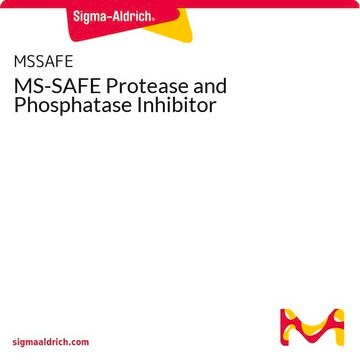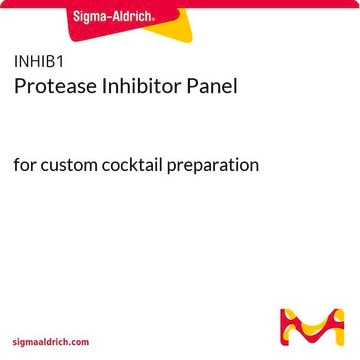P2714
Protease Inhibitor Cocktail
lyophilized powder, for the inhibition of serine, cysteine and metallo-proteases, for general use, lyophilized powder
Synonym(s):
Protease Inhibitor Cocktail from bovine lung, Protease Inhibitor Mix, Protease inhibitor
About This Item
Recommended Products
product name
Protease Inhibitor Cocktail powder, for general use, lyophilized powder
biological source
bovine lung
Quality Level
form
lyophilized powder
storage temp.
−20°C
Looking for similar products? Visit Product Comparison Guide
General description
Specificity
Application
- in radioimmunoprecipitation assay buffer to lyse the avian crystalline lens samples for western blot analysis
- in phosphate buffer solution (PBS) for grinding recombinant protein expressed leaves to purify virus-like particles (VLPs)
- in PBS to dissolve lyophilized skin secretion sample of A. loloensis for peptide purification
- in 0.1 M NaCl solution to wash and collect skin secretions of frog
Biochem/physiol Actions
Components
AEBSF at 2 mM
Aprotinin at 0.3 μM
Bestatin at 116 μ
E-64 at 14 μM
EDTA at 1 mM
Leupeptin at 1 μM
Each component has specific inhibitory properties.
Caution
Quantity
Not all extracts contain the same levels of endogenous enzymes, and it may be necessary to adjust the volume of cocktail required.
Preparation Note
Other Notes
related product
Signal Word
Warning
Hazard Statements
Precautionary Statements
Hazard Classifications
Eye Irrit. 2 - Skin Irrit. 2
Storage Class Code
11 - Combustible Solids
WGK
WGK 3
Flash Point(F)
Not applicable
Flash Point(C)
Not applicable
Certificates of Analysis (COA)
Search for Certificates of Analysis (COA) by entering the products Lot/Batch Number. Lot and Batch Numbers can be found on a product’s label following the words ‘Lot’ or ‘Batch’.
Already Own This Product?
Find documentation for the products that you have recently purchased in the Document Library.
Customers Also Viewed
Our team of scientists has experience in all areas of research including Life Science, Material Science, Chemical Synthesis, Chromatography, Analytical and many others.
Contact Technical Service













